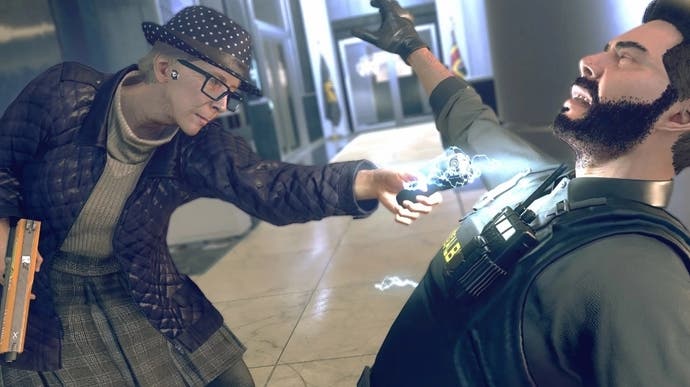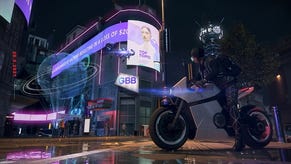Watch Dogs Legion's London is impressive, but I'm worried its main gimmick will fall flat
Capital punishment.
Of course, Watch Dogs Legion's E3 demo starts in a pub. It's the kind of upmarket boozer where city types in chino suits manspread across leather sofas, necking Riesling after a hard day moving money between accounts. It's late in the evening, so there's the usual prick wearing shades despite being sat inside, boot up on the arm of a strandmon while quaffing Brewdog. Wandering out on the street, we're only a block away from Parliament, which looks stunning despite the shitshow going on inside. Across the Thames, the London Eye towers over the near-future skyline, lit in red like a neon Sauron.
All of which is to say, Watch Dogs Legion has nailed the London look. Yes, it's a bit too Dick van Dyke with its cockerney accents. Yes, its treatment of our current political binfire feels like fortuitous window-dressing. But this may be the best version of London ever put in a game, and its addition of things like a protest camp in the middle of a graffitied Trafalgar Square seem eerily prescient.
What doesn't work so well in the demo, for me, is everything else. Watch Dogs Legion's bold claim of being able to play as anybody in London is not an exaggeration, but I left my hands-on session still wondering why you would want to do so, and what benefits it would actually add to the overall experience. This system, going by what was on offer at E3, is designed to offer procedurally-generated busywork to churn through before you can get to the game itself. Oh, and being the granny? So slow. So slow.
As with previous games, every Watch Dogs NPC comes with a basic profile - a random combination of a name and a snippet of backstory. In Legion, this profile has been expanded, so you can now see how much an NPC likes or dislikes hacktivist hero team DedSec. You can now read the names of an NPC's family members/associates and see their daily schedule. Lastly, each NPC now has a random video game stat perk, such as "+10% injury recovery" or "+30% damage resistance while sprinting", which is a bit odd to see slapped on an average-looking businessman - whose most notable skill IRL would likely be how long he can burp after downing pints.
It's possible one of these small stat buffs relates to a particular playstyle you're after, though when recruiting an NPC you can bestow any of Watch Dogs Legion's three character classes upon them anyway. Out of everything it's this which perhaps surprises me the most. The ability to recruit anyone from London is an astonishing technical feat - but in a game at pains to treat its backdrop as accurately as possible, its cast of NPCs feel like identikit action heroes. Perhaps this is the reality of having to turn this complicated system into an actual video game - that everybody encouraged over into DedSec's ranks has to be able to wield a gun and leap over rooftops like Jason Statham, regardless of their appearance or individual skillset. Or, perhaps, all UK citizens get military training after Brexit.
Legion's character classes felt like variations on the same theme. The Infiltrator is geared towards stealth, with perks for better tagging enemies and abilities to take them down silently. The Hacker, meanwhile, has a cool spider robot which can stealth itself into places for you and... also take down enemies silently. And then there's the Enforcer, the most outright combat-focused of the three, but which also comes with a cool stealth perk: being able to hack an enemy's sight (don't ask) so you are cloaked from their view. You can use this to take down enemies silently as well.
Ubisoft was only showing an abbreviated version of the NPC recruitment gameplay loop at E3, but the gist sounds like it will be similar in the main game. If you want to play as someone who likes DedSec, you'll perform a small procedurally-generated mission for them based on their profile - hacking into a nearby computer terminal to scrub evidence of petty theft, for example - and they'll happily join up. Within minutes, I had a nearby gran enlisted and sneaking around inside New Scotland Yard, all in the name of hacktivism.
Later, I enlisted someone else - a lady who was being harassed. By looking at her profile, I could see when and where she was going to meet her harasser, like it was an appointment in her diary. I could then go there and beat up the harasser to get the lady on-side. Job done! If only life was so simple! Then, I was told, I could even go to the nearby hospital where the harasser was now recovering from the injuries I gave them, and use my DedSec influence to bump them to the front of the NHS waiting list. An audio message popped up letting the harasser know the person who had put her in the hospital (AKA, me) was now helping her out. And that was enough to get the harasser signed up as a fellow DedSec chum also. Two for the price of one!
Perhaps it's because I've not spent hours with these characters, but when one does go down in a hail of gunfire, there's no reason to feel particularly attached. It's just a matter of switching to a different avatar to pick up the mission when it reloads. Within a few seconds I'm playing as a different person, a Hacker instead of Infiltrator, but my spiderbot does the same things I did previously - I'm just standing on the other side of a wall. It all reminds me of another London-set Ubisoft game - the similarly grim Zombi U - which also had permadeath - but used the feature far more effectively.
The original Watch Dogs' protagonist Aiden Pearce was as forgettable as they come, but I warmed to Watch Dogs 2's Marcus Holloway. He was cheeky, nerdy. When he died, I cared. Maybe he's somewhere to be found in Legion's London. Maybe I can go hunt him down instead.











